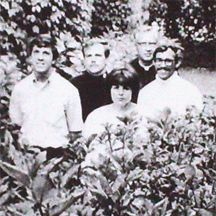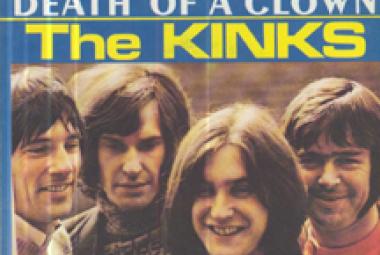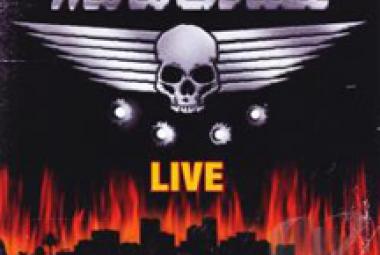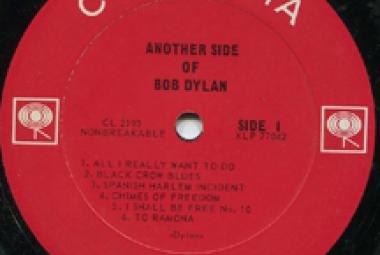THE SEARCH PARTY
The Under Appreciated Rock Artist for this month is NICK FREUND, a Catholic priest who joined the faculty at the St. Pius X Seminary, in Galt, California (near Sacramento) where he taught for 8 years as an English teacher and headed the band and choir. He worked on choral music and an amazing acid-folk Christian album by a group called the Search Party. The double CD that I have has the intriguing title, The News Is You: The Sacred & Secular Music of Nick Freund, on Lion Productions Records.
Much as happened with the priest who oversaw the creation of last month’s UARB, the Holy Ghost Reception Committee #9, his students were resistant to the classical composers like Mozart and Beethoven and told him: “Father, you ought to check out a place in San Francisco called The Fillmore.”
* * *
What Rev. Nicholas T. Freund found there was a revelation, and did he show up on a good night that first time: The performers were Cream, Quicksilver Messenger Service and Big Brother and the Holding Company. He recounts in the CD’s liner notes: “Eric Clapton’s guitar playing amazed me. . . . Janis Joplin . . . blew me away. The next day, the kids said: ‘Get your records out! Nick’s been to the Fillmore!’ I became interested in adapting the San Francisco sound to church music.”
As Nick Freund puts it: “I enjoy Bach and Gregorian chant. But I don’t see it as an expression of today. It’s like a beautiful old painting in a museum – you admire and appreciate it, but it has no relevance to ‘Now’. We should express our worship of God in terms we use today.” Also: “I could spend years writing a classical concert, and nobody would ever hear it.”
* * *
Nick Freund began working with four of his students to form a band that took the name the Search Party: Peter Apps (lead guitar and vocals), Joanie Goff (vocals and guitar), Jim Carvalho (bass, guitar and vocals), and Tim King (drums). Freund himself was evidently on organ and composed most of the music; he also produced the album. The music was recorded in 1968 at the Montgomery Chapel at San Francisco Theological Seminary, so Montgomery Chapel became the name of the album. Just 600 copies were pressed on the tiny Century Records label, and the band performed together live only once, at a sort of “thank you” party. Nick Freund left California and joined the faculty at Mount Saint Paul College in Waukesha, Wisconsin later that year.
Perhaps owing to the desire to meld religious sentiments with psychedelic music, most of the songs are at a meditative pace, but there are some guitar fireworks on display from time to time. The vocals are simply lovely, with strong lead vocals that are often punctuated by eerie choral sections.
The songs where Joanie Goff has the lead are particularly notable, such as the opening track “Speak to Me”: “I feel you in the mountains, I feel you in the sea / I feel you all around me Lord / Oh Lord, speak to me!”
Goff sings harmony vocals on “When He Calls”: “When He calls, He’ll ask you to die; burn your boats and walk at His side / When He calls, He seldom tells why; it’s up to you to face and decide.”
* * *
The religious messages in the remaining songs by the Search Party are more subtle. Nick Freund recalls: “I wrote [“You and I”] after returning from counseling a divorced woman. I tried to incorporate into the song the tenseness I felt when talking to her. It’s an expression of today’s station-wagon housewife, tense and keyed up, frustrated with life.” Joanie Goff expresses these feelings wonderfully in her lead vocals on this song.
The only long song on the Search Party album, “So Many Things Have Got Me Down” has stuttering musical passages and shares sentiments common in 1960’s young people: “I don’t know why I’m hanging around, so many things have got me down / I alone, all alone, no one to talk with, nobody needs me / I want someone to share the nothing that I offer . . . Some have said that God is dead; others complain about what is said . . . My friends say religion is a private club for those who can’t face the contradictions of life”.
On the final song on the album, “The News Is You”, the band finally rocks out.
Nick Freund again: “It took me five years to learn songs shouldn’t answer questions, but should pose them. I used to write songs with answers, but they were trite – really ech! . . . People go through life from day to day, getting up, going to work, coming home, eating, going to bed, and maybe a fishing trip or vacation thrown in once in a while. There’s more to life, and it is the artist’s job to make people see it.”
About the Search Party album that he worked on, Freund said: “Some people react to the record by saying it’s depressing. It’s not depressing – it’s deep. It quiets you down and makes you think.”
* * *
The remainder of the first CD has several popular-music renditions of selected sections of the Catholic Mass. These songs are not unlike what could be heard at churches across the country for the past several decades, though not this lovely and rich – the same meditative pace on much of the Search Party album is also present here.
* * *
The music on the second disk also came out on Century Records; it is performed by the St. Pius X Seminary Choir and is called Each One Heard in His Own Language. This music was written and arranged in the year or two before the Search Party album came together, and the work was performed live in the Spring of 1968. This disc also includes the first music recorded by Peter Apps of the Search Party, who sings some passages and also plays lead guitar.
* * *
“Side 2” is subtitled Mass for the Secular City and is, I suppose, a proper Mass set to popular rhythms, or at least the song listing seems to indicate that. A choir is accompanied by a full band, and the same powerful organ on the Search Party’s Montgomery Chapel is in evidence on this music.
* * *
The Search Party had its origins in the Rejects, a garage rock band that originally included Peter Apps and Jim Carvalho among its members. Formed in about 1963, the Rejects also included Mike Casey on lead guitar and Mark Helmar on rhythm guitar; Apps was the drummer. Their repertoire included “Little Black Egg” that had been recorded by the Golliwogs (who later became Creedence Clearwater Revival) and “Mr. Tambourine Man”, the Bob Dylan song that was a hit for the Byrds.
Later Tim King was recruited as the new drummer, and Jacques Fourie was added as a rhythm guitarist. The musicians were also in various other bands as well as the school band and glee club. Nick Freund discovered Joanie Goff (now Joan Goff Nelson) when he put together a high school choir in Sacramento. He asked her to be the female lead in their production of Oliver!.
After Joanie Goff joined the Rejects, they changed their name to Mother Cabrini Jug Band and Punt Return Team (ah, youth!) and had some local gigs and a performance at the Agnew State Hospital.
* * *
While not giving the album a glowing review, Richie Unterberger says in Allmusic of the Search Party’s Montgomery Chapel album (the original release, that is): “There were many psychedelic albums like this issued in small press runs in the late ’60s: folky, bittersweet melodies that tilted toward the downright sad and melancholy; high strident female vocals sharing duties with less memorable, more normal-sounding male singing; a studied over-seriousness to the vocal delivery; a naïve, questing-for-the-meaning-of-life tone to the compositions; and organ residing in a halfway house between the LSD trip and the mortuary. Even if you take it as a given that most of these albums have a dated pretentiousness that many would poke fun at, however, this is certainly one of the better such efforts in this mini-genre, and possessed of some real musical appeal in spite of its considerable flaws. Most of the arrangements have an understated, effective (if somewhat creepy) eeriness. Songs like ‘Speak to Me’, ‘Renee Child’, ‘Poem By George Hall’, and ‘The Decidedly Short Epic of Mr. Alvira’ are good time-capsule mood pieces in their evocative otherworldliness, at times sounding a little like a psychedelic seance.”
(September 2014)















